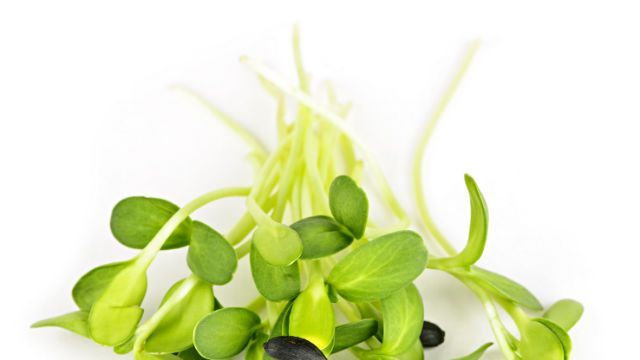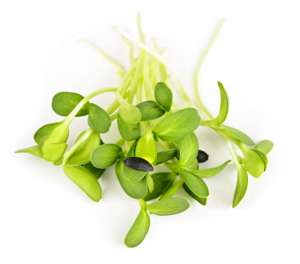
A sprout is the leaf stalk of a plant that has just cracked out of its seed, and is just starting to poke up out of the soil. Sprouts may be small, but they are packed with nutrition and they have many health benefits at this stage of their growth.
Here are only six of many reasons to eat more of them.
Plentiful enzymes
There are more enzymes in a tiny sprout than in a fully grown fruits or vegetables. The enzymes allow your body to extract more vitamins, minerals and other nutrients from other foods that you eat, and aid in your digestion and overall well-being.
Vitamin increase
Sprouts increase their vitamin content up to 20 times its original value only a few days after they have sprouted.
Quality protein
Calcium and magnesium bind to proteins in the seed, which makes them more available and usable in the body.
High fiber content
Fiber binds to the fat and toxins in our bodies and helps them find a way out. It also moves them quickly along so that the fat is not absorbed through the walls of the intestines.
Essential fatty acids
Your body is not able to produce omega-3 and omega-6 fatty acids on its own, but eating more sprouts is a great way to supplement them. A few benefits from these fatty acids are assisting in the development and function of the brain and nervous system, and helping to regulate proper thyroid and adrenal activity.
Potential for cancer prevention
 Eating 100 grams of sprouts a day may help prevent cancer.“In 1997, Johns Hopkins’ researchers found that broccoli sprouts contained up to 50 times more cancer fighting benefits than broccoli alone, due to their much higher sulforaphane content.
Eating 100 grams of sprouts a day may help prevent cancer.“In 1997, Johns Hopkins’ researchers found that broccoli sprouts contained up to 50 times more cancer fighting benefits than broccoli alone, due to their much higher sulforaphane content.
Phytoestrogens
Clover and alfalfa sprouts contain phytoestrogens called coumestans. Coumestans have been linked to potentially helping in the prevention of menopausal symptoms, osteoporosis, cancer and heart disease.
These power packed little sprouts carry so many nutritional benefits, and they’re so easy to grow yourself. When you grow them yourself be sure to use organic seeds, nuts, beans, and gluten-free grains.
Here are a few steps to starting your sprouts:
- Wash your seeds and drain them in a colander.
- Fill a jar about ⅕ full of water. It’s better to keep a smaller amount in the jar so the seeds won’t mold.
- Pour room temperature water over the seeds. Fill the jar to the top and cap it with a mesh lid – or you can use cotton cloth.
- Set the jar on the counter out of direct sunlight, and let the seeds soak for 8 to 10 hours.
- Drain off the water through the mesh lid or cloth. Open the container, and pour cool to lukewarm water over the seeds, and swish them around. Reseal the container and drain off the water again.
- Place the container in a dark place. Rinse and drain the seeds twice daily. It’s important to keep them moist.
- Growth usually starts within two or three days, so just keep an eye on them.
- After about day 4 or 5, they should be ready to harvest.
- Rinse and drain them and place them on a paper towel to dry of about 8 hours.
Now they’re ready to be eaten!
-The Alternative Daily
Sources:
http://livelovefruit.com/2013/03/health-benefits-of-sprouting/#Oz03lWs1UxPzEbZw.99
http://www.hungryforchange.tv/article/10-reasons-to-love-sprouts-plus-diy-sprouting-at-home

